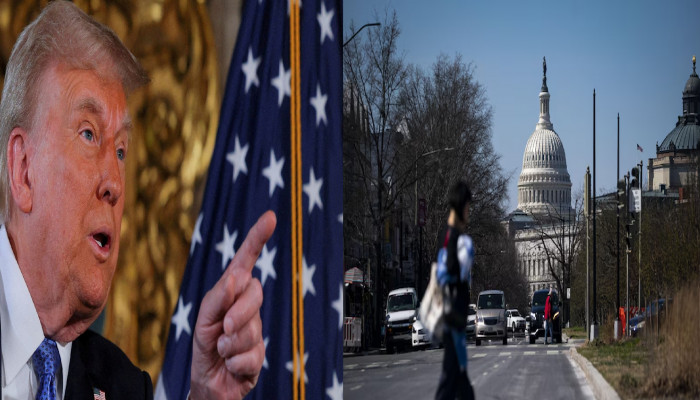US government faces shutdown as House blocks Trump-endorsed spending plan
- In Reports
- 06:06 PM, Dec 20, 2024
- Myind Staff
US politicians have turned down a spending bill supported by President-elect Donald Trump, leaving Congress without a clear solution to stop an upcoming government shutdown. On Wednesday, Mr. Trump rejected a bipartisan agreement between Republicans and Democrats that aimed to prevent the shutdown just before the Christmas holiday.
He encouraged Republicans in the House of Representatives to support a new plan that included extending government funding for three months and temporarily suspending the debt limit until January 2027. The debt ceiling sets a limit on how much the federal government can borrow. The redesigned Republican proposal was deemed "laughable" by House minority leader and leading Democrat Hakeem Jeffries, who voted against it Thursday night by a vote of 175-235, with 38 Republicans and all but two Democrats voting against it. A number of Republicans have stated that if they did not also reduce spending, they would not be interested in lifting the debt ceiling.
"It's like... increasing your credit card limit, while you don't do anything to actually constrain spending," said Republican Representative Chip Roy. This outcome is a huge setback for Mr. Trump and his billionaire friend Elon Musk, who was given the responsibility by the incoming president to cut the federal budget. Musk, a tech entrepreneur and the world’s richest person played a key role earlier in the week in opposing the bipartisan funding deal. He posted multiple times on his social media platform X, calling it "criminal." His opposition caused support for the deal to quickly fall apart. Now, Congress has until Friday at midnight to pass a spending bill that would prevent the government from shutting down.
"We're going to regroup and we will come up with another solution, so stay tuned," House Speaker Mike Johnson said after the vote. However, Trump persisted in his demands that Congress either remove the debt ceiling or extend it until 2029. "Congress must get rid of, or extend out to, perhaps, 2029, the ridiculous debt ceiling. Without this, we should never make a deal," he asserted in a post on Truth Social on Friday morning. He has repeatedly asked Republicans in the House to resolve pending issues before he takes office on January 20. This leaves the government in a state of uncertainty, with only hours left to finalise a new bill for a vote.
Meanwhile, in case the House doesn't approve a spending bill or extend the deadline, a government shutdown will start, affecting federal employees and the public services they provide. Important government agencies like the FBI, Border Patrol, and Coast Guard will stay open. However, the Transportation Security Administration has warned that travellers might face long lines at airports. National parks and monuments will close, and while military troops will remain at their posts, many civilian workers in agencies like the Department of Defense will be sent home.
Sometimes, federal workers are put on furlough, which means they keep their jobs but don't work temporarily until the government reopens. Other federal employees may continue working but they won’t get paid during this time, though they expect to receive their full pay once the government reopens. Courts would be impacted, with civil cases being paused, but criminal cases would still move forward. Automated tax collection would continue as usual, but the IRS would stop auditing tax returns. During Mr. Trump's first term in office, the most recent government shutdown in history occurred in December 2018 and January 2019.







Comments